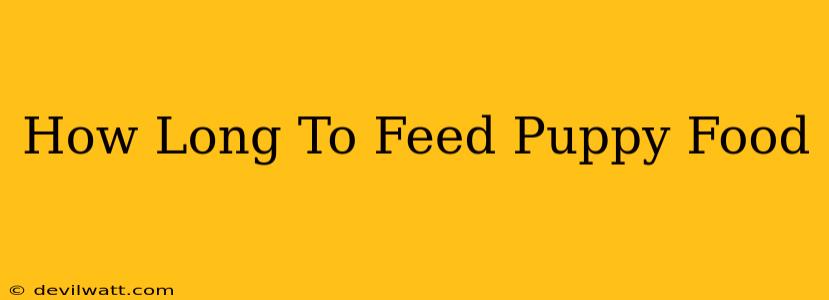Choosing the right food and knowing how long to feed your puppy puppy food is crucial for their healthy development. This comprehensive guide will walk you through the stages of puppyhood and help you determine the ideal timeframe for transitioning to adult dog food.
Understanding Puppy Nutritional Needs
Puppies have different nutritional requirements than adult dogs. Their bodies are growing rapidly, requiring higher levels of protein, fat, and essential nutrients for optimal development. Puppy food is specifically formulated to meet these increased demands. Key nutrients include:
- Protein: Essential for muscle growth and development.
- Fat: Provides energy for active play and growth.
- Calcium & Phosphorus: Crucial for strong bones and teeth.
- Vitamins & Minerals: Support overall health and immune function.
The Importance of High-Quality Puppy Food
Investing in a high-quality puppy food is paramount. Look for foods that:
- List a named meat source (e.g., chicken, lamb) as the first ingredient. This indicates a higher protein content.
- Are formulated specifically for puppies of your breed size. Large breed puppies have different nutritional needs than small breed puppies.
- Contain added vitamins and minerals to support growth.
- Are from reputable brands that undergo rigorous quality control.
How Long Should You Feed Puppy Food?
The general guideline is to feed your puppy puppy food until they reach approximately 80% of their adult size. This typically occurs between 12 to 18 months of age. However, several factors influence this timeframe:
-
Breed Size: Smaller breeds mature faster than larger breeds. Small breeds might transition to adult food as early as 9-12 months, while giant breeds might need puppy food until 18-24 months.
-
Individual Growth Rate: Some puppies grow faster than others. Monitor your puppy's growth and consult your veterinarian if you have any concerns.
-
Veterinarian Recommendations: Your vet can provide personalized guidance based on your puppy's breed, size, growth rate, and overall health.
Signs Your Puppy is Ready for Adult Food:
- Slower Growth Rate: You'll notice a decrease in the rate at which your puppy is gaining weight and height.
- Adult-Like Body Shape: Their body starts to resemble that of an adult dog of their breed.
- Veterinarian Approval: Your vet's assessment is crucial before transitioning.
Gradual Transition to Adult Food:
Never abruptly switch your puppy to adult food. A gradual transition is essential to avoid digestive upset. The process typically takes 7-10 days:
- Mix: Start by mixing a small amount of adult food with their current puppy food.
- Increase Gradually: Over several days, gradually increase the proportion of adult food while decreasing the puppy food.
- Monitor: Watch for any signs of digestive issues such as diarrhea, vomiting, or changes in stool consistency.
When to Consult Your Veterinarian:
Consult your veterinarian if:
- Your puppy shows signs of malnutrition or excessive weight gain.
- You have concerns about your puppy's growth rate.
- Your puppy experiences any digestive problems during the transition.
By understanding your puppy's nutritional needs and following these guidelines, you can ensure they receive the proper nourishment for healthy growth and development. Remember, consistent veterinary check-ups are vital for monitoring your puppy's health and growth.

